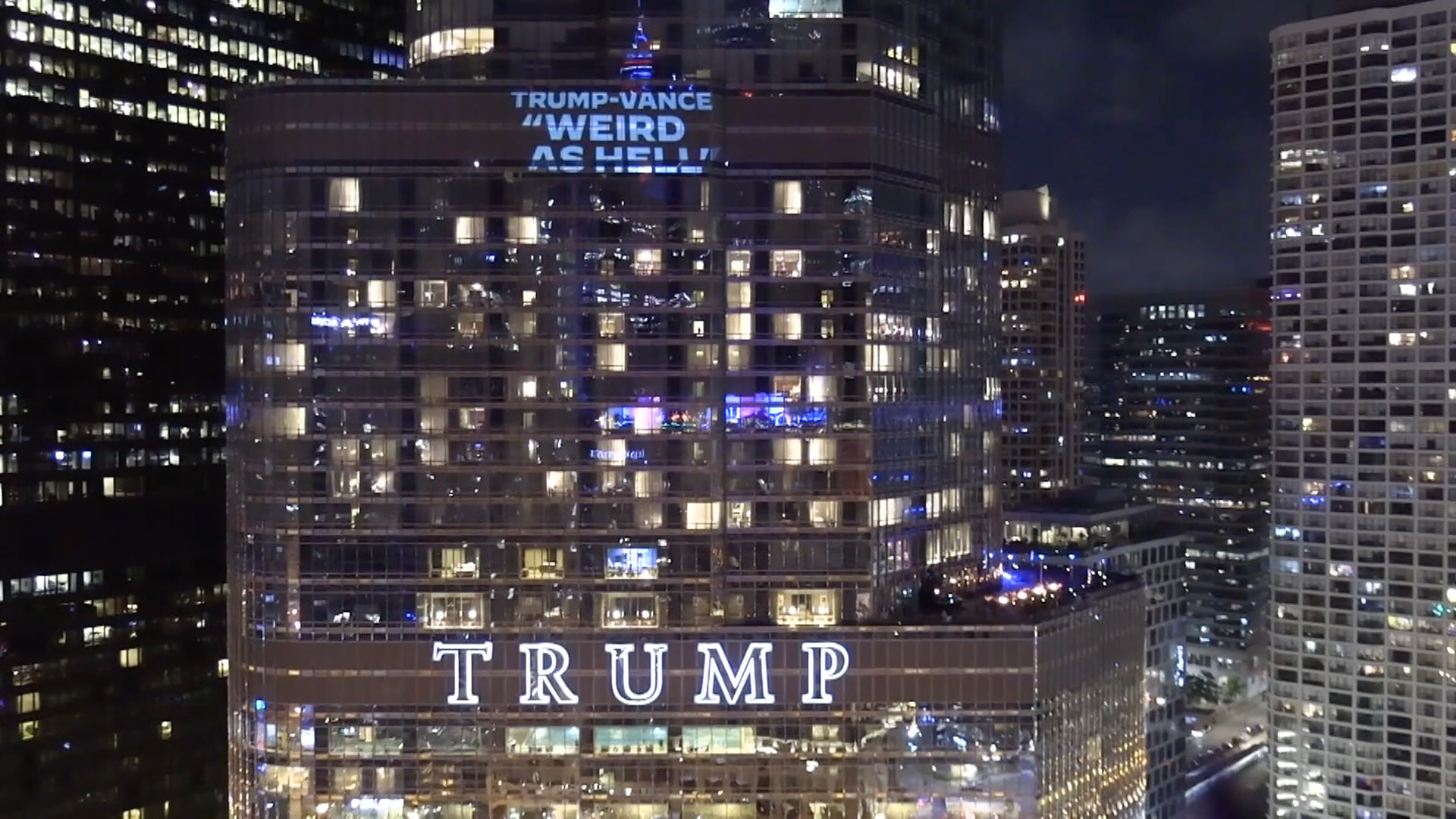'Voting Kamala … (is) a vote against another four years of faith leaders justifying the actions of a man who destroys the message Jesus came to spread,' said Jerushah Duford, granddaughter of the Rev. Billy Graham.

Democratic presidential nominee Vice President Kamala Harris speaks during a campaign event at the Hendrick Center for Automotive Excellence in Raleigh, N.C., Friday, Aug. 16, 2024. (AP Photo/Julia Nikhinson)
August 16, 2024
By Jack Jenkins
By Jack Jenkins
RNS
(RNS) — A diverse group of Christians is throwing support behind Vice President Kamala Harris’ White House bid, organizing fundraisers and Zoom calls in hopes of helping catapult the Democrat to victory in November — and, they say, reclaiming their faith from Republicans in the process.
Their efforts come on the heels of similar campaigns aimed at specific constituency groups, such as the recent “White Dudes for Harris” Zoom call that featured celebrities and grabbed headlines. John Pavlovitz, a liberal-leaning Christian author and activist, was on that call when he hatched the idea for a Christian-centric version and texted his friend Malynda Hale, a singer, actress and fellow activist.
“We had a conversation about how, specifically on the Democratic side of the political spectrum, you don’t hear a lot of people talking about their faith,” Hale told Religion News Service in an interview. “We wanted people to know that there are progressive Christians, there are Christians on the Democratic, left-leaning side, so that they didn’t feel alone.”
The result was Christians for Kamala, a part-fundraiser, part-virtual roundtable livestreamed event on Monday (Aug. 12). Featured speakers cited their faith as they praised liberal policies and personally endorsed Harris — who recently entered the presidential race after President Joe Biden bowed out — and her running mate, Minnesota Gov. Tim Walz. Over the course of the nearly three-hour event, the group raised more than $150,000 for the Harris campaign, a number that has climbed to just shy of $200,000 in the days since.
“It’s been really difficult to keep up with the flood of comments and connections that have been coming in,” said Pavlovitz, who said the only formal help he received from the Harris campaign was in setting up a donation system for fundraising.
A number of Christian groups — including evangelicals, a constituency key to former President Donald Trump’s base — have assembled similar calls in the lead up to next week’s Democratic National Convention in Chicago. Most have had little to no assistance from the official Harris-Walz campaign, which, barely a month old, has yet to announced a dedicated faith outreach director. The emerging grassroots coalition vies not only to bolster Harris but also to push back on what organizers say is a false assumption that to be Christian is to be a Republican — or a supporter of former President Donald Trump.

Signage is hung Aug. 14, 2024, on the exterior of the United Center in preparation for next week’s Democratic National Convention in Chicago.(AP Photo/Pablo Martinez Monsivais)
Christianity has long been associated with the Republican Party, which is more than 80% Christian, according to a 2022 survey from the Public Religion Research Institute. It has also been associated with Trump, who has benefitted from the consistent support of white evangelical voters.
But while the same PRRI poll found that 31% of Democrats are religiously unaffiliated, the majority — around 60% — still ascribe to various forms of Christianity. The difference lies in the types of Christians that make up each party’s ranks: Whereas 68% of the GOP are white Christians (with 30% of the party represented by white evangelical Protestants alone) only 24% of Democrats are the same, and they are primarily white Catholics (10%) and white mainline Protestants (9%), while white evangelicals only represent 4%. Meanwhile, Black Protestants — a key part of the Democratic base — constitute 16% of the Democratic Party, with Hispanic Protestants representing 3%, Hispanic Catholics 12% and “other Christians” rounding out the group with an additional 6%.
That diversity was on display during the Christians for Kamala call, which included a mix of faith leaders such as the Rev. Jacqui Lewis, of Middle Collegiate Church in New York City, and the Rev. Lennox Yearwood Jr., head of the nonprofit Hip Hop Caucus; activists like environmentalist Bill McKibben and LGBTQ+ rights advocate Charlotte Clymer; commentators such as CNN’s Van Jones; and politicians, including New Jersey Sen. Cory Booker and Texas State Rep. James Talarico.
The speakers linked their support for specific policies, such as working to blunt the impacts of climate change or passing immigration reform, to their faith and Christian Scripture. Some rebuked conservative Christianity’s ties to the GOP, calling it a form of Christian nationalism.
“My faith in Jesus leads me to reject Christian nationalism and commit myself to the project of a multiracial, multicultural democracy where we can all freely love God and fully love our neighbors,” said Talarico, a Presbyterian Church (USA) seminarian who has been vocal in his condemnation of Christian nationalism in his state. “That same faith leads me to support Vice President Harris to be the next president of the United States.”
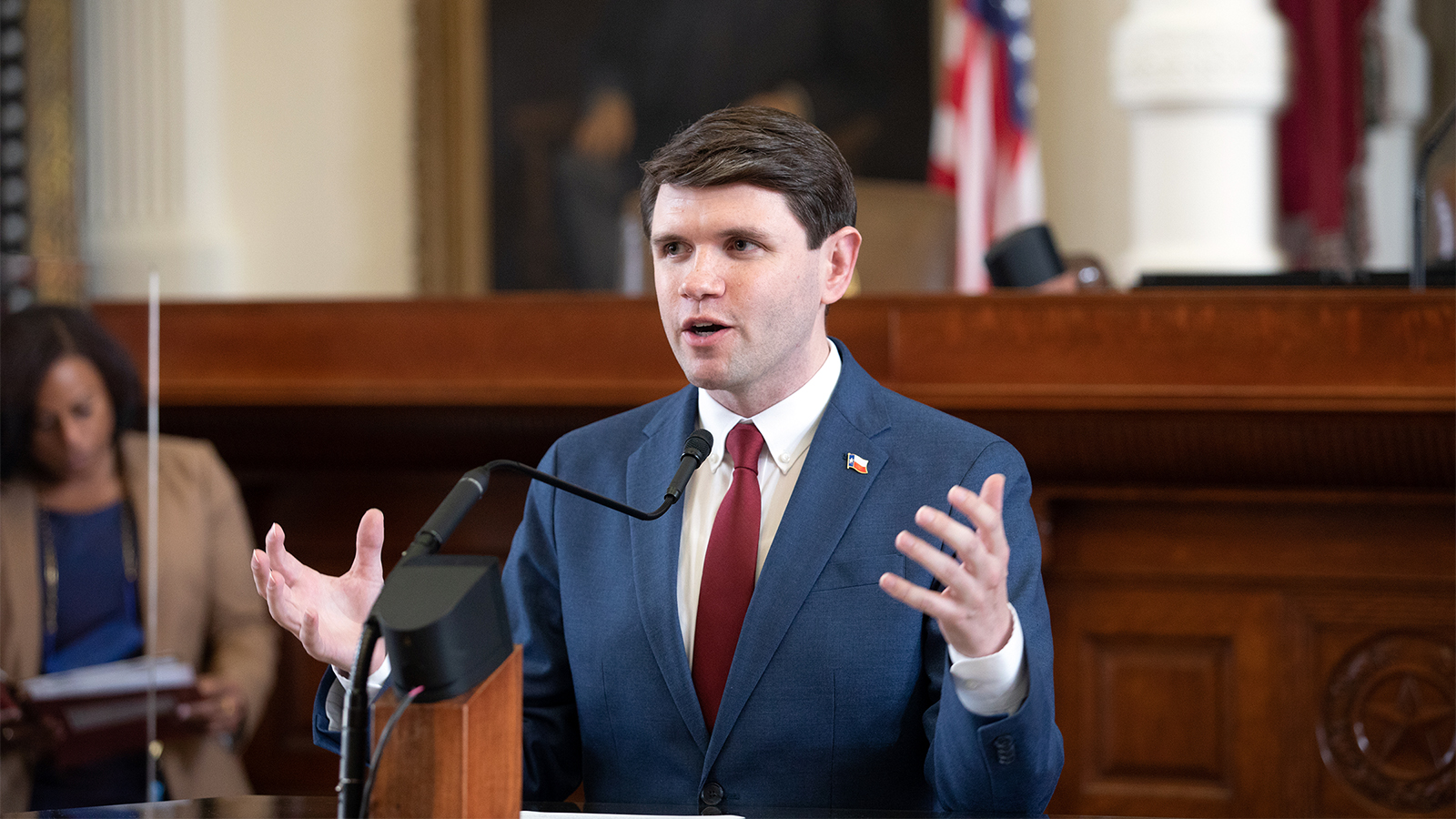
Texas state Rep. James Talarico speaks on the floor of the Texas House of Representatives on May 24, 2021, in Austin, Texas. (Courtesy photo)
Although a member of a mainline denomination, Talarico was also a speaker on a separate “Evangelicals for Harris” Zoom call assembled on Wednesday evening. Organized by Faith Voters, a 501(c)4 organization, the effort was geared toward conservative Christians who have disproportionately sided with Trump. The call struck a different tone than Christians for Kamala: some speakers noted they had never endorsed a candidate before, and at least one pastor suggested he was risking friendships and relationships with his congregation by participating.
News of the event sparked blowback from conservatives, such as Sean Feucht, an evangelical worship leader and activist who once ran for Congress in California and has at least informally worked with prominent Republican strategists for his own initiatives. Feucht, who has also said he is in regular contact with Trump’s campaign staff, accused evangelicals who participated in the call of apostasy and heresy, deriding them on social media as “Heretics for Harris.”
In addition, the Rev. Franklin Graham, son of famed evangelist Rev. Billy Graham, decried a new advertisement produced by Evangelicals for Harris targeting swing state voters, saying it was “trying to mislead people” by using images of his father.
But call participants like evangelical activist Shane Claiborne appeared unmoved by the criticism, as was Jerushah Duford, a counselor who is also Billy Graham’s granddaughter and Franklin Graham’s niece.
“Voting Kamala, for me, is so much greater than policies,” Duford said. “It’s a vote against another four years of faith leaders justifying the actions of a man who destroys the message Jesus came to spread, and that is why I get involved in politics.”
Jemar Tisby, an author and historian who spoke during the call, told RNS that while he grew up in conservative Christian communities, he does not identify as evangelical himself, preferring the term “evangelical adjacent.” Even so, he felt compelled to participate because, he said, “we have the choice before us between democracy and authoritarianism, and I feel like this is a historic moment when people of conscience need to take a stand.”
Tisby, author of the forthcoming book “The Spirit of Justice: True Stories of Faith, Race, and Resistance,” also praised the diversity represented on the call, some of which was conducted in Spanish. He said it represented a broader understanding of evangelicalism than is often represented in U.S. politics.
“Many people of color, many women, many people who traditionally have not been platformed or been passed the mic, are now able to have their voices heard. I think that’s very significant,” Tisby said.
The call closed with remarks from former Rep. Adam Kinzinger of Illinois, a Republican who drew backlash from fellow conservatives after he became one of 10 Republicans to vote to impeach Trump for insurrection connected to the Jan. 6, 2021, attack on the U.S. Capitol. He argued the current Republican Party does not resemble “conservatism or, frankly, Christianity,” and lamented “pastors and faith leaders that have sold themselves down the river.” Some of today’s support for Trump, he said, amounted to a form of idol worship.
There are “certainly a few things that can make God a little jealous,” he said, “and one of those is worshipping something other than Him. And that’s what you see in today’s GOP.”
The calls add to a slate of organizing efforts launched in recent days aimed at specific religious groups. Nearly 500 faith leaders have signed on to a letter endorsing Harris, a “Latter-day Saints for Harris” call was convened last week and multiple separate calls have been organized for Jewish Americans — including one on Thursday that targeted Jewish women and featured singer Barbra Streisand.
A separate “Catholics for Kamala” call, facilitated in part by the Harris campaign, was also slated for this week but organizers rescheduled it until after the Democratic National Convention, citing scheduling conflicts.
According to Pavlovitz, his group is already partnering with others, such as Catholics for Kamala, Christian Democrats of America and Vote Common Good. What form their collaborations take remains to be seen, but Pavlovitz said he is hopeful for whatever comes next.
“We’ve all begun talking as a part of this process about what these partnerships could look like moving forward,” he said. “There is talk about some, you know, collective expression of our spirituality, which is really what this was about.”
Opinion
Why I’m a Christian for Kamala but not a ‘Christian for Kamala’
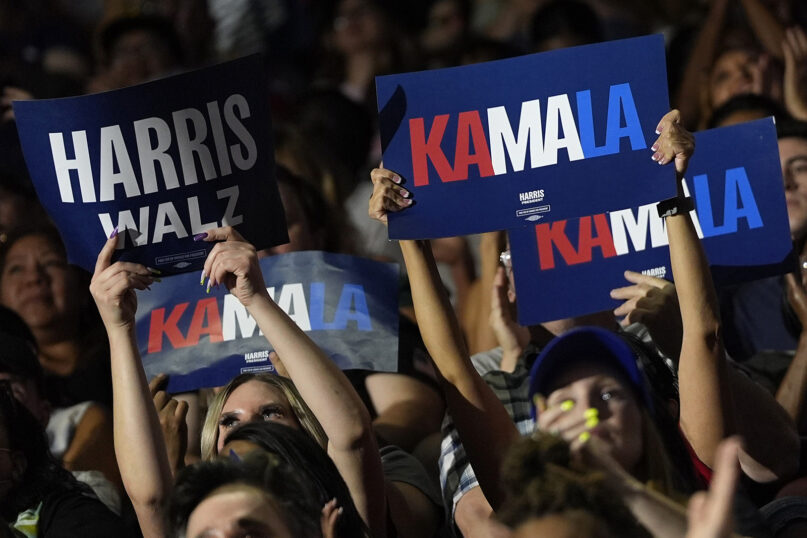
Supporters display signs in the audience before Democratic presidential nominee Vice President Kamala Harris speaks at a campaign rally, Aug. 10, 2024, in Las Vegas.
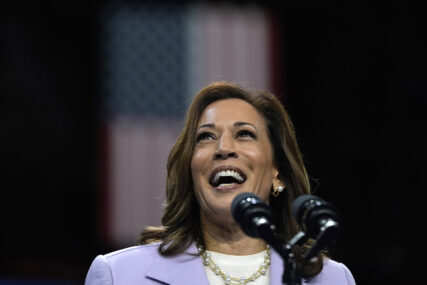
Democratic presidential nominee Vice President Kamala Harris speaks at a campaign rally, Aug. 10, 2024, in Las Vegas. (AP Photo/Julia Nikhinson)
So, yeah. It’s been a vibe shift. And as a white Christian guy who has always found himself in the statistically unusual position of opposing Trump, I can’t say I’m mad about any of it. Trump’s reelection odds are looking mighty iffy, and goodbye and good riddance to them. But I don’t think that automatically makes me a die-hard Christian for Kamala either.
My politics don’t conveniently map onto either political party. I think most Christians feel the same way. Heck, I think most people feel the same way. This isn’t because I’m one of those faux-sanctimonious centrists who see staking out the middle ground between Republicans and Democrats as a worthy goal in and of itself. It’s just that a lot of things I’d like to see done politically are not being touted by either party.
For example, I’d like to see some action on climate change commensurate with the actual threat it poses. I’d like to see the U.S. stop sending strongly worded letters to Israeli Prime Minister Benjamin Netanyahu and actually shut off the endless stream of weapons that allow him to vaporize whole entire blocks and everyone on them. I’d like to see every American earn a living wage and have access to health care. I want well-funded public schools. I want strong unions. I want LGBTQ kids to live without fear. I want accountability for police and other authority figures who abuse their power, particularly where racial minorities are concerned. And so on and so forth.
These things are important to me, and while context clues suggest the Harris/Walz ticket comes a lot closer to achieving at least some of them than the Trump/Vance one does, that’s just an educated guess. Harris’ website doesn’t have a policy section and she’s been light on interviews with the press. I can live with that for a while, given the extraordinary circumstances of her apparent nomination. But given the Democratic Party’s track record, I’m a little skeptical. While the Republican Party of the last few years has staunchly opposed many of those goals, Democrats haven’t exactly been wildly enthusiastic about them either. Will Harris break with Biden’s blank checks to the Israeli military? I hope so, but I have yet to see any concrete evidence that she’ll try.
For these reasons, I’m less interested in being a “Christian for Kamala” than I am in being a “Christian with particular and occasionally even contradictory politics who is forced to make a strategic vote in this two-party system and will ultimately pull the lever for the candidate who seems more likely to hear my side out than the other candidate is.” (Not the catchiest name, but you get the idea.)
Based on what I know right now, that candidate is pretty clearly Harris. Of course, it’s at least conceivable that a third candidate would be more in line with my politics than Harris is. I know plenty of people sleep better by casting a symbolic vote for a third-party candidate or writing in their own dream option. I don’t begrudge anyone that, but it’s never been clear to me how these votes actually help struggling people. I’m all for working to disrupt the two-party system, but it seems to me that voting day is probably the least effective possible time to do so, especially if your overall goal is to put people in charge who can make the world a little better for people who are struggling right now.
But the reason I hesitate to call myself a “Christian for Harris” is that when we pledge allegiance to one political candidate, we surrender a lot of the power we have in a democracy. This is more than just semantics. Our political influence comes not just from who we decide to vote for, but how we use our voices in the intervening years between elections. A “Christians for Undocumented Immigrants” group has a lot more leverage to influence politicians and hold them accountable than a “Christians for (Politician)” group does, because the former isn’t beholden to a single flawed person who is susceptible to mistakes and lobbyists and squishy polling data and billionaire donors, but to a noble cause.

Anti-abortion protesters celebrate after the Supreme Court’s decision to overturn Roe v. Wade, the federally protected right to abortion, outside the Supreme Court in Washington, June 24, 2022. The Supreme Court ended constitutional protections for abortion that had been in place nearly 50 years, a decision by its conservative majority to overturn the court’s landmark abortion cases. (AP Photo/Gemunu Amarasinghe)
For an example of how quickly these “Christians for (Politician)” groups go awry, look no further than Harris’ opponent. I personally spoke with many Christians in 2016 who admitted they found many things about Trump distasteful but voted for him anyway because of their opposition to abortion. Anti-abortion groups’ support for Trump turned out to be well-placed, as Trump’s GOP delivered a once-unthinkable Roe v. Wade overturn. However, Republicans now seem a little sheepish about this victory, as it has turned out to be a significant electoral liability. They’re so embarrassed about gutting federal abortion protections that they’re distancing themselves from all responsibility for this herculean accomplishment and omitting a pledge to ban abortion nationwide from the official party platform for the first time in 40 years.
Given this apparent reversal on the ostensibly all-important issue of abortion, have “Christians for Trump” withdrawn their support? Have these single-issue voters stood outside of Trump rallies and demanded he make his position clear on Florida’s abortion amendment? Has evidence that overturning Roe actually led to an uptick in abortion led these groups to find new ways to bring these rates in line with their stated goals? Current polling has observed no such break.
Once you’ve thrown in with a candidate, it’s much easier to shift your values to align with that person than to pressure the candidate to align their policies with your values.
I bring this up not to draw any moral or political equivalence between Trump and Harris, who are very different people. But I do think it’s a helpful illustration of the pitfalls that come from backing a politician instead of a political vision.
In the Gospels, Jesus proclaims a unique vision of the world — one where the meek inherit the earth and the mourning are comforted. I do not think either Trump or Harris is going to bring the kingdom proclaimed in the Sermon on the Mount to reality. I do think Harris is likely to get us marginally closer, but not if all of us just put the entirety of our weight behind her, no questions asked.
Now is not the time to pledge blind allegiance. Now is the time to start making some demands.
(Tyler Huckabee is a writer living in Nashville, Tennessee, with his wife and dogs. Read more of his writing at his Substack. This column does not necessarily reflect the views of Religion News Service.)
Why I’m a Christian for Kamala but not a ‘Christian for Kamala’
Now is not the time to pledge blind allegiance. Now is the time to start making some demands.

Supporters display signs in the audience before Democratic presidential nominee Vice President Kamala Harris speaks at a campaign rally, Aug. 10, 2024, in Las Vegas.
(AP Photo/Julia Nikhinson)
August 14, 2024
By Tyler Huckabee
RNS
(RNS) — I watched the Christians for Kamala live event with a good deal of interest. For one thing, I’m a Christian. For another, I plan on voting for Kamala Harris in November. I guess that makes me a Christian for Kamala. Or does it?
The event, organized by John Pavlovitz and Malynda Hale, was a real success as these things go. It raised over $150,000 and brought in a murderers’ row of respected Christian leaders to rally the growing but still somewhat nebulous and unorganized religious not-right around the Harris/Walz ticket. Many of the featured guests were people whose lives and ministry have meant a lot to me — people like Diana Butler Bass, the Rev. Jacqui Lewis, William Matthews and the Rev. Dante Stewart. I’ve learned from these people and they made the Christian case for Harris with grace and conviction, highlighting her campaign’s inclusive and liberation-minded spirit, contrasting it with Donald Trump’s whole thing. It was, all told, a pretty convincing couple of hours.
So why was I left feeling unconvinced?
Let’s take a step back and evaluate the genuinely disorienting vibe shift we’ve all been through over the last month. After President Joe Biden’s disastrous debate performance against Trump, I felt the same spirit of bitter cynicism practically everyone to the left of JD Vance felt. The polls were all but unanimous: Biden was going to lose and nobody was surprised. “Here go the Democrats again!” “They’re addicted to losing!” “We hate life and ourselves! We can’t govern!”
Except this time, Democrats did something nobody could have seen coming: They took action. Thanks to what sure sounds like a dramatic, high-stakes few days of behind-the-scenes political maneuvering, Biden agreed to bow out of the race and endorse his vice president for the 2024 ticket.
Since then, the Harris campaign has been soaring on good vibes, huge rallies and coconut memes. This energy only got more juice from the addition of Minnesota Gov. Tim Walz, whose jovial demeanor and bawdy dressing-down of his opponents made him all but impervious to the right’s various attempts to smear his military record. Meanwhile, Trump the Campaigner is, for more or less the first time, on his heels. His famed bravado has been replaced by a meandering, listless desperation, and Sen. Vance’s efforts to blow some fresh wind into the sails have been dampened by a naked and charmless misogyny.
RNS
(RNS) — I watched the Christians for Kamala live event with a good deal of interest. For one thing, I’m a Christian. For another, I plan on voting for Kamala Harris in November. I guess that makes me a Christian for Kamala. Or does it?
The event, organized by John Pavlovitz and Malynda Hale, was a real success as these things go. It raised over $150,000 and brought in a murderers’ row of respected Christian leaders to rally the growing but still somewhat nebulous and unorganized religious not-right around the Harris/Walz ticket. Many of the featured guests were people whose lives and ministry have meant a lot to me — people like Diana Butler Bass, the Rev. Jacqui Lewis, William Matthews and the Rev. Dante Stewart. I’ve learned from these people and they made the Christian case for Harris with grace and conviction, highlighting her campaign’s inclusive and liberation-minded spirit, contrasting it with Donald Trump’s whole thing. It was, all told, a pretty convincing couple of hours.
So why was I left feeling unconvinced?
Let’s take a step back and evaluate the genuinely disorienting vibe shift we’ve all been through over the last month. After President Joe Biden’s disastrous debate performance against Trump, I felt the same spirit of bitter cynicism practically everyone to the left of JD Vance felt. The polls were all but unanimous: Biden was going to lose and nobody was surprised. “Here go the Democrats again!” “They’re addicted to losing!” “We hate life and ourselves! We can’t govern!”
Except this time, Democrats did something nobody could have seen coming: They took action. Thanks to what sure sounds like a dramatic, high-stakes few days of behind-the-scenes political maneuvering, Biden agreed to bow out of the race and endorse his vice president for the 2024 ticket.
Since then, the Harris campaign has been soaring on good vibes, huge rallies and coconut memes. This energy only got more juice from the addition of Minnesota Gov. Tim Walz, whose jovial demeanor and bawdy dressing-down of his opponents made him all but impervious to the right’s various attempts to smear his military record. Meanwhile, Trump the Campaigner is, for more or less the first time, on his heels. His famed bravado has been replaced by a meandering, listless desperation, and Sen. Vance’s efforts to blow some fresh wind into the sails have been dampened by a naked and charmless misogyny.

Democratic presidential nominee Vice President Kamala Harris speaks at a campaign rally, Aug. 10, 2024, in Las Vegas. (AP Photo/Julia Nikhinson)
So, yeah. It’s been a vibe shift. And as a white Christian guy who has always found himself in the statistically unusual position of opposing Trump, I can’t say I’m mad about any of it. Trump’s reelection odds are looking mighty iffy, and goodbye and good riddance to them. But I don’t think that automatically makes me a die-hard Christian for Kamala either.
My politics don’t conveniently map onto either political party. I think most Christians feel the same way. Heck, I think most people feel the same way. This isn’t because I’m one of those faux-sanctimonious centrists who see staking out the middle ground between Republicans and Democrats as a worthy goal in and of itself. It’s just that a lot of things I’d like to see done politically are not being touted by either party.
For example, I’d like to see some action on climate change commensurate with the actual threat it poses. I’d like to see the U.S. stop sending strongly worded letters to Israeli Prime Minister Benjamin Netanyahu and actually shut off the endless stream of weapons that allow him to vaporize whole entire blocks and everyone on them. I’d like to see every American earn a living wage and have access to health care. I want well-funded public schools. I want strong unions. I want LGBTQ kids to live without fear. I want accountability for police and other authority figures who abuse their power, particularly where racial minorities are concerned. And so on and so forth.
These things are important to me, and while context clues suggest the Harris/Walz ticket comes a lot closer to achieving at least some of them than the Trump/Vance one does, that’s just an educated guess. Harris’ website doesn’t have a policy section and she’s been light on interviews with the press. I can live with that for a while, given the extraordinary circumstances of her apparent nomination. But given the Democratic Party’s track record, I’m a little skeptical. While the Republican Party of the last few years has staunchly opposed many of those goals, Democrats haven’t exactly been wildly enthusiastic about them either. Will Harris break with Biden’s blank checks to the Israeli military? I hope so, but I have yet to see any concrete evidence that she’ll try.
For these reasons, I’m less interested in being a “Christian for Kamala” than I am in being a “Christian with particular and occasionally even contradictory politics who is forced to make a strategic vote in this two-party system and will ultimately pull the lever for the candidate who seems more likely to hear my side out than the other candidate is.” (Not the catchiest name, but you get the idea.)
Based on what I know right now, that candidate is pretty clearly Harris. Of course, it’s at least conceivable that a third candidate would be more in line with my politics than Harris is. I know plenty of people sleep better by casting a symbolic vote for a third-party candidate or writing in their own dream option. I don’t begrudge anyone that, but it’s never been clear to me how these votes actually help struggling people. I’m all for working to disrupt the two-party system, but it seems to me that voting day is probably the least effective possible time to do so, especially if your overall goal is to put people in charge who can make the world a little better for people who are struggling right now.
But the reason I hesitate to call myself a “Christian for Harris” is that when we pledge allegiance to one political candidate, we surrender a lot of the power we have in a democracy. This is more than just semantics. Our political influence comes not just from who we decide to vote for, but how we use our voices in the intervening years between elections. A “Christians for Undocumented Immigrants” group has a lot more leverage to influence politicians and hold them accountable than a “Christians for (Politician)” group does, because the former isn’t beholden to a single flawed person who is susceptible to mistakes and lobbyists and squishy polling data and billionaire donors, but to a noble cause.

Anti-abortion protesters celebrate after the Supreme Court’s decision to overturn Roe v. Wade, the federally protected right to abortion, outside the Supreme Court in Washington, June 24, 2022. The Supreme Court ended constitutional protections for abortion that had been in place nearly 50 years, a decision by its conservative majority to overturn the court’s landmark abortion cases. (AP Photo/Gemunu Amarasinghe)
For an example of how quickly these “Christians for (Politician)” groups go awry, look no further than Harris’ opponent. I personally spoke with many Christians in 2016 who admitted they found many things about Trump distasteful but voted for him anyway because of their opposition to abortion. Anti-abortion groups’ support for Trump turned out to be well-placed, as Trump’s GOP delivered a once-unthinkable Roe v. Wade overturn. However, Republicans now seem a little sheepish about this victory, as it has turned out to be a significant electoral liability. They’re so embarrassed about gutting federal abortion protections that they’re distancing themselves from all responsibility for this herculean accomplishment and omitting a pledge to ban abortion nationwide from the official party platform for the first time in 40 years.
Given this apparent reversal on the ostensibly all-important issue of abortion, have “Christians for Trump” withdrawn their support? Have these single-issue voters stood outside of Trump rallies and demanded he make his position clear on Florida’s abortion amendment? Has evidence that overturning Roe actually led to an uptick in abortion led these groups to find new ways to bring these rates in line with their stated goals? Current polling has observed no such break.
Once you’ve thrown in with a candidate, it’s much easier to shift your values to align with that person than to pressure the candidate to align their policies with your values.
I bring this up not to draw any moral or political equivalence between Trump and Harris, who are very different people. But I do think it’s a helpful illustration of the pitfalls that come from backing a politician instead of a political vision.
In the Gospels, Jesus proclaims a unique vision of the world — one where the meek inherit the earth and the mourning are comforted. I do not think either Trump or Harris is going to bring the kingdom proclaimed in the Sermon on the Mount to reality. I do think Harris is likely to get us marginally closer, but not if all of us just put the entirety of our weight behind her, no questions asked.
Now is not the time to pledge blind allegiance. Now is the time to start making some demands.
(Tyler Huckabee is a writer living in Nashville, Tennessee, with his wife and dogs. Read more of his writing at his Substack. This column does not necessarily reflect the views of Religion News Service.)
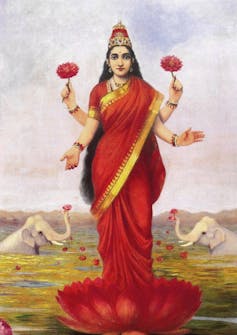
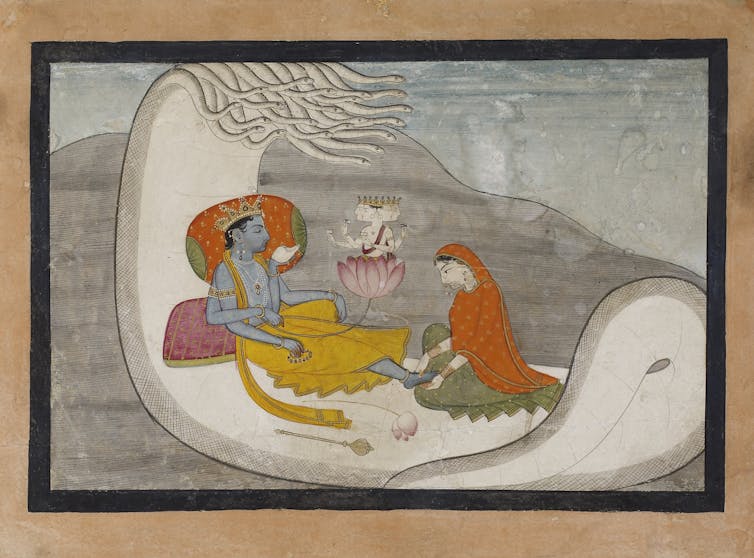
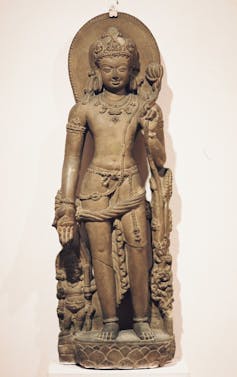



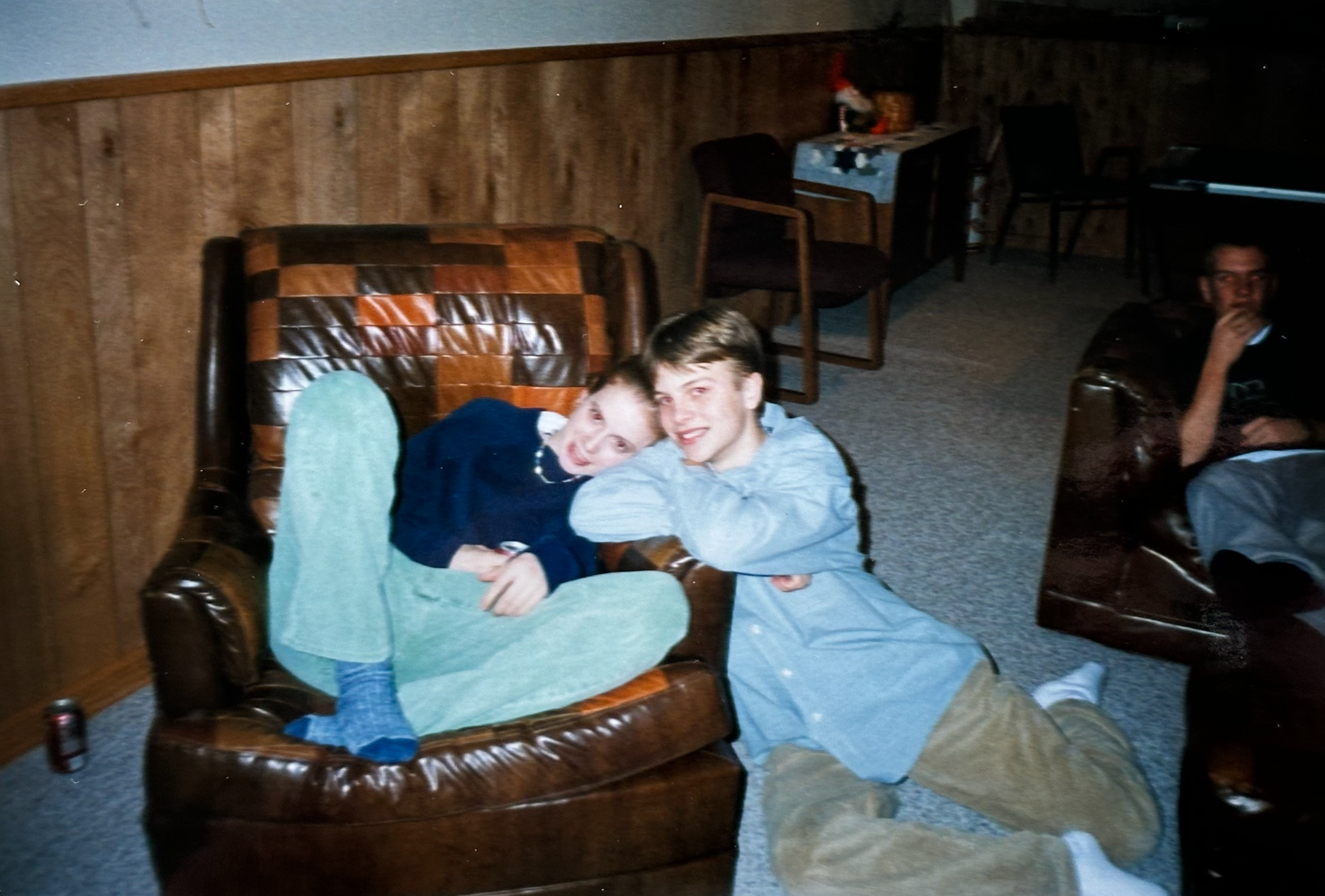
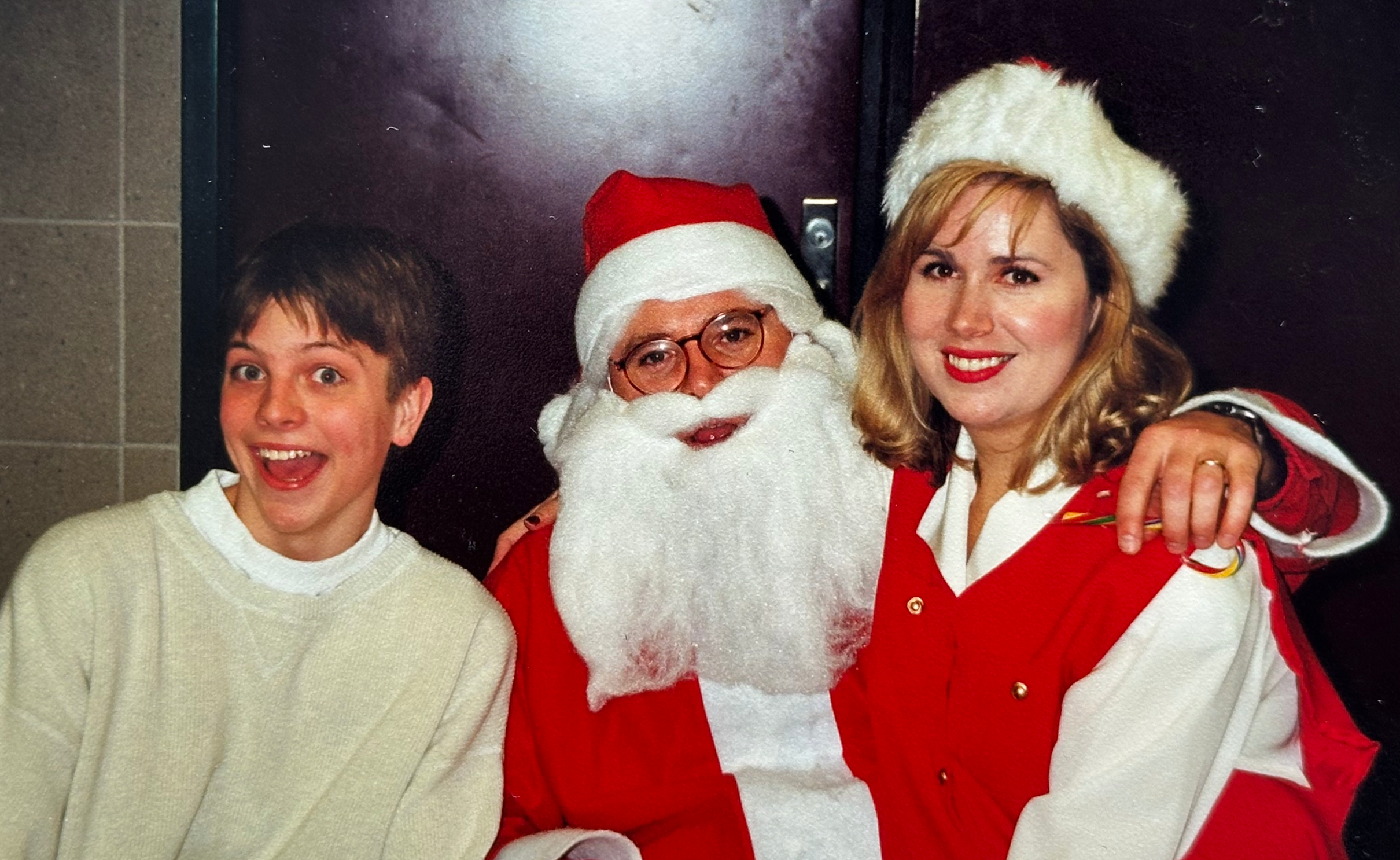

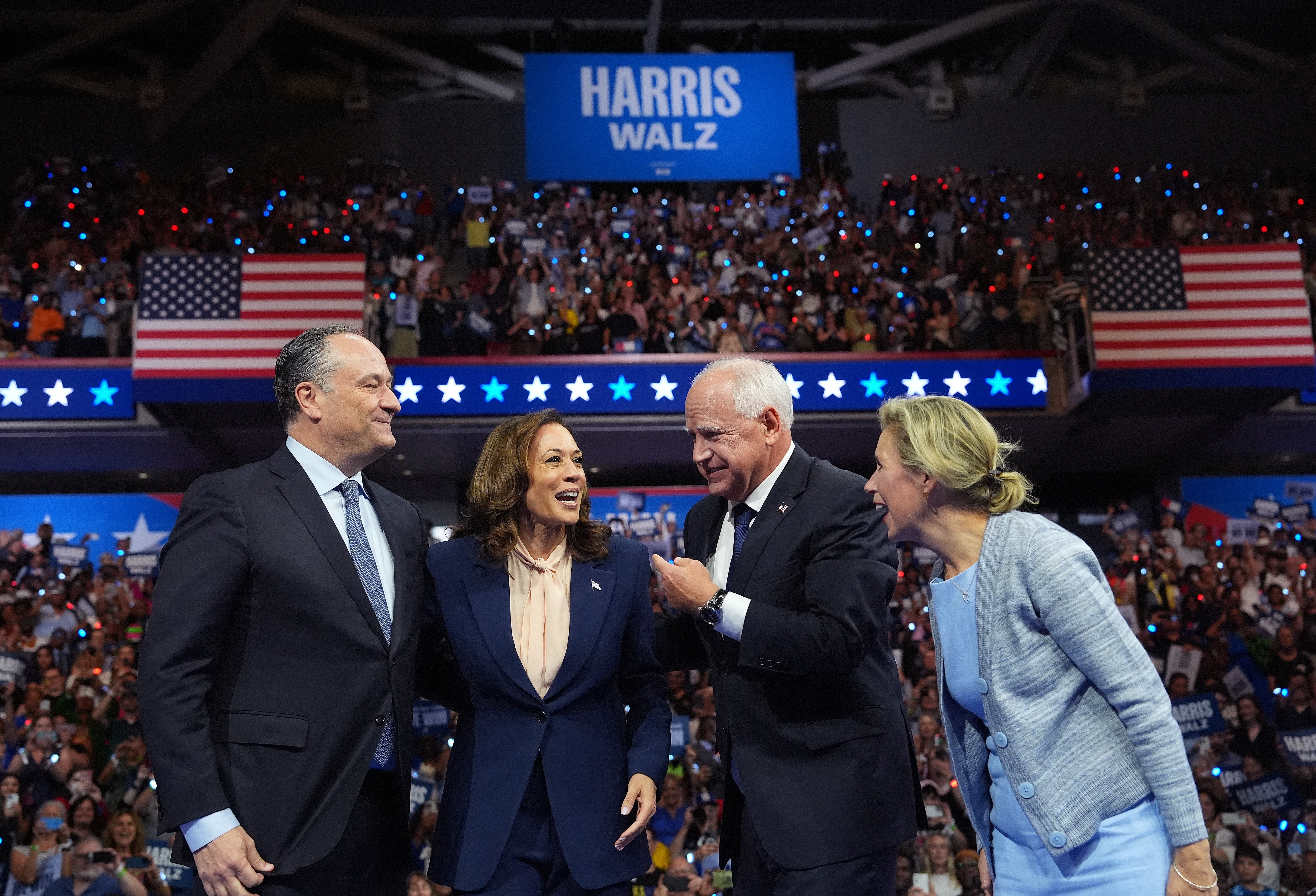
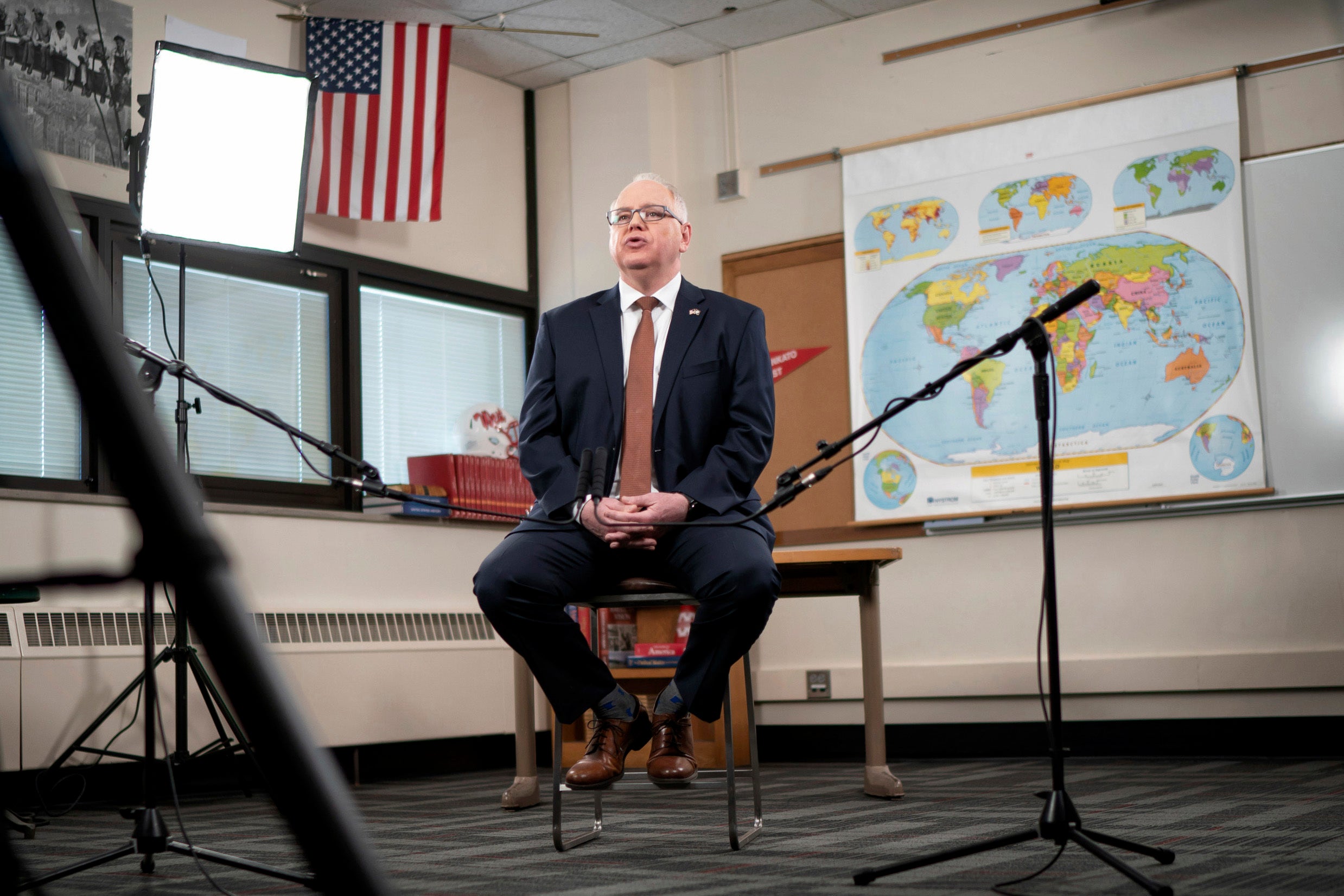 Minnesota Governor Tim Walz giving his State of the State address in 2021, from his old classroom at Mankato West High School (AP)
Minnesota Governor Tim Walz giving his State of the State address in 2021, from his old classroom at Mankato West High School (AP) Tim Walz taught geography at Mankato West High School in Mankato, Minnesota, from 1996 to 2006, before he ran for Congress (AP)
Tim Walz taught geography at Mankato West High School in Mankato, Minnesota, from 1996 to 2006, before he ran for Congress (AP)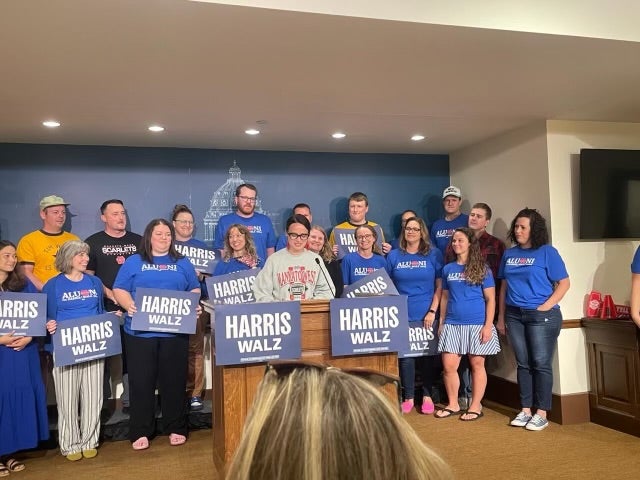 Former students of Tim and Gwen Walz have launched a self-organized Mankato West Alumni for Harris-Walz group to campaign for Kamala Harris and her running mate (Richelle Nortan)
Former students of Tim and Gwen Walz have launched a self-organized Mankato West Alumni for Harris-Walz group to campaign for Kamala Harris and her running mate (Richelle Nortan)